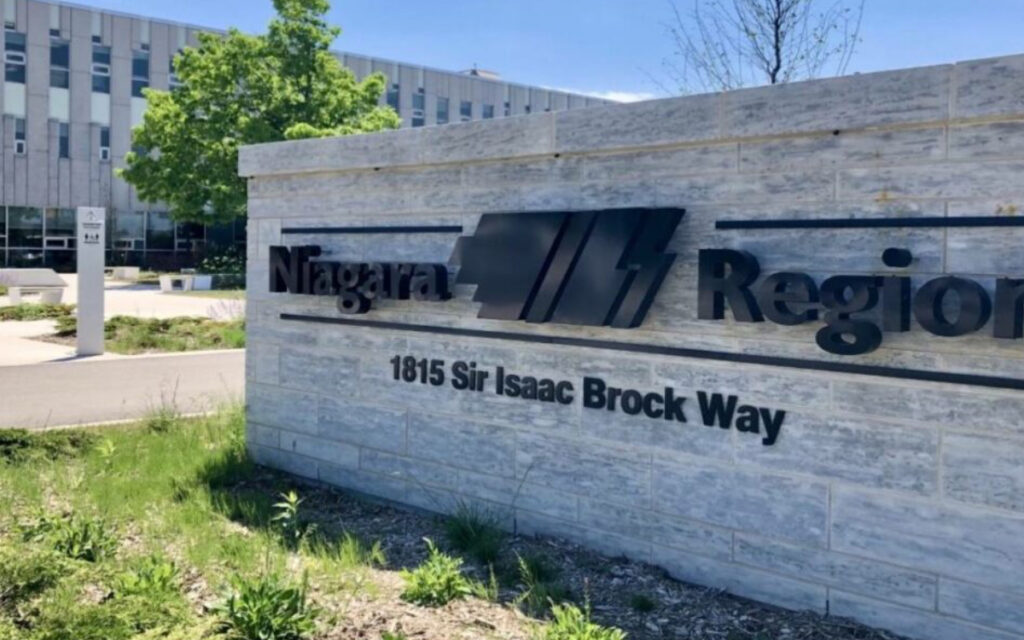
Councillor Diana Huson, who proposed the motion, says her goal is to have council better address how to interact with the public and how to best ensure the public can participate in debates at council in the future. Photo Credit: The Niagara Independent.
Niagara’s regional council is bringing in the integrity commissioner to review what occurred at a boisterous council meeting held on Jan. 25.
Council had been set to debate Councillor Haley Bateman’s motion that would have seen the regional municipal government endorse a call for a ceasefire in the conflict between Israel and Hamas.
Dozens of local backers of Bateman’s motion came to the Jan. 25 meeting to speak on behalf of Bateman’s proposal but ultimately did not have a chance to do so.
Before Bateman’s motion was debated, St. Catharines Mayor Mat Siscoe, who is a member of regional council, moved a motion of his own to remove Bateman’s motion from council’s agenda.
Council voted 26 to 2 in favour of Siscoe’s motion.
Many of those who supported Siscoe’s effort felt that having a debate over the present conflict between Israel and Hamas isn’t something that is in the purview of local government, given that foreign policy is set by the federal government.
After Bateman’s motion was taken off the agenda, supporters of her motion were quite vocal in protest. Regional Chair Jim Bradley had to suspend council’s meeting on two occasions for at least 20 minutes and the public was ultimately removed from the council chambers. Bradley repeatedly warned the protestors that their continued disruptions would lead to their removal and ultimately decided that the move was necessary.
Last week, council passed a motion to refer the incident to integrity commissioner Michael Maynard. The motion was put forward by Councillor Diana Huson of Pelham. Part of the motion and Maynard’s involvement will trigger a training session for councillors on how to handle such boisterous meetings in the future.
Local protestors, led by the Niagara Palestine Coalition, were outside of the building councillors were meeting in to once again protest council’s refusal to debate or take a position on the present conflict between Israel and Hamas.
Bateman remains unhappy with how the process unfolded and objected to Huson’s move to bring in the integrity commissioner. Huson’s move also allowed council to avoid debating and reviewing the minutes from the Jan. 25 council meeting, as Bateman had hoped to do.
Huson defended her actions, saying that the Jan. 25 meeting was chaotic and unruly and noted that several community members who had hoped to present and participate were ultimately unable to do so.
Huson says her goal is to have council better address how to interact with the public and how to best ensure the public can participate in debates at council in the future.
Bateman will still have an opportunity to voice her concerns during the integrity commissioner’s review process, as will all other members of regional council.
Bateman vigorously opposed Siscoe’s motion and Bradley’s decision to end the Jan. 25 council meeting without considering her move to call a point of order. Those moves ultimately led to the public not being able to speak with councillors about their views on the ongoing conflict in the Middle East and the role that they hoped the regional government could play in relaying their concerns.
Bateman feels that bringing in the integrity commissioner is not a good use of taxpayer dollars. Most other councillors felt that the cost is worthwhile if it means improving how council approaches incidents like those that occurred on Jan. 25 in the future.

Jay Goldberg is the Ontario Director at the Canadian Taxpayers Federation. He previously served as a policy fellow at the Munk School of Public Policy and Global Affairs. Jay holds a Ph.D. in Political Science from the University of Toronto.




















